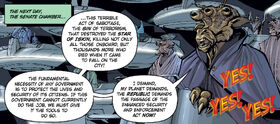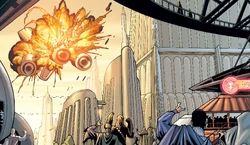- "The fundamental necessity of any government is to protect the lives and security of its people. If this government cannot currently do the job, we must give it the tools to do so. I demand, my planet demands, the Republic demands the passage of the Enhanced Security and Enforcement Act now!"
- ―Senator Ask Aak
The Enhanced Security and Enforcement Act, also known as the Security Enforcement Act or simply as the Security Act, was a bill approved by the Galactic Senate of the Republic during the Clone Wars. The act was one of many war-time amendments to the Galactic Constitution voted upon by the Senate that centralized the balance of power in the Republic, pulling it away from the citizenry and focusing it primarily within the Office of the Supreme Chancellor, which was at the time held by Palpatine of Naboo. The original legislation provided the Supreme Chancellor of the Republic with the legal authority to approve searches and seizures without due process and order the unlimited usage of observation droids. This draft was later amended with the Security Act amendment, which included a provision that placed the High Council of the Jedi Order under the command of the Supreme Chancellor.
The act was originally proposed in 21 BBY, but was officially tabled from discussion in the Senate. Later that year, the Alderaanian Senator Bail Prestor Organa was attacked by a pirate force while en route to the the galactic capital of Coruscant. Organa's colleagues in the Senate were appalled by the attack and so insisted that Palpatine reintroduce the act to the Senate's agenda. It was given wide support, but was challenged by a small but vocal minority consisting of Senator Mon Mothma, former Chancellor Finis Valorum, and Organa himself. Despite their efforts, the act passed after the Senate was galvanized by a terrorist attack on a refugee transport ship, the Star of Iskin.
The approval of the act resulted in a heavy restriction of civil liberties across the Republic, but particularly on Coruscant. The act was viewed negatively by the Jedi Order, which believed it was just one instance out of many in which Palpatine was manipulating the Senate into ceding its powers to his office. In the immediate wake of the bloody Battle of Coruscant, the Senate yet again convened to review the act, this time amending it to restructure the Republic Armed Forces' chain of command. The Security Act amendment placed Palpatine at the top of the Military command structure and, when combined with the Reflex Amendment, gave him the authority to issue the Sector Governance Decree, which effectively terminated the authority of the Senate as a balancing branch of government. These acts and amendments were followed shortly by the establishment of the Galactic Empire with Palpatine's Declaration of a New Order in 19 BBY.
Description[]
- "The Enhanced Security and Enforcement Act in particular, specifically those measures that permit the unrestricted use of observation droids, and searches and seizures without the need for warrants or due process."
- ―Senator Bail Organa

As a result of the amended Security Act, the 19 BBY Jedi High Council answered to the authority of the Supreme Chancellor.
The Enhanced Security and Enforcement Act was an amendment to the Galactic Constitution around which the Galactic Republic was organized.[3] The act was crafted in response to the galaxy-wide Clone Wars, and transferred several powers from the Galactic Senate to the office of the Republic's executive, the Supreme Chancellor. It also granted the Supreme Chancellor several powers that conflicted with the civil liberties that were guaranteed to Republic citizens under the mandates of the Galactic Constitution.[1]
Two of these powers were the Supreme Chancellor's ability to authorize the unlimited usage of observation droids for security purposes, and his ability to allow Republic forces to perform searches and seizures without due process.[3] Among the other clauses of the act was a provision that outlined harsh penalties for pirates captured by the Republic. These penalties included the possibility of capital punishment.[5] Throughout the course of the war, the Enhanced Security and Enforcement Act was modified by several amendments to the original legislation, collectively referred to as the "Security Acts."[4] The act also became known as the "Security Enforcement Act."[6]
The act was altered one final time in 19 BBY, two years after its original ratification, by an amendment that was primarily concerned with the organization of the Republic Armed Forces (RAF) command structure. The RAF was under the jurisdiction of the Senate for the majority of the war; the Security Act amendment placed both the Grand Army of the Republic and the Jedi Order under the command of the Supreme Chancellor. As such, the amendment also included a provision for the creation of the office of Supreme Commander, which would be a title for the Supreme Chancellor in his capacity as the Republic's military leader. It was specifically noted by the Jedi High Council that, despite granting him legal control of the Jedi Order, the amendment did not provide the Chancellor with the standing to decide the assignments of specific Jedi.[4] The alterations to the constitution outlined in the act were intended to expire when the period of galactic crisis abated,[1] or when the Senate held a vote to overturn the legislation.[3]
History[]
Proposed and tabled[]
- "Palpatine! The Senate votes him these extraordinary powers and he asks for more. Then the Senate gives them to him!"
- ―Former Chancellor Finis Valorum
With the outbreak of the Separatist Crisis in 24 BBY, the Galactic Senate of the Republic began to entrust unprecedented power into the Office of the Supreme Chancellor, which was at the time occupied by Palpatine of Naboo. This was achieved through a series of amendments to the Galactic Constitution that began with the indefinite extension of his term as Chancellor with the Emergency Powers Act. This trend only intensified with the eruption of the Clone Wars in 22 BBY and the formation of the Grand Army of the Republic, intended to stand against the droid army of the separatist Confederacy of Independent Systems. As war raged throughout the galaxy and Palpatine continued to gain popularity throughout the Republic as a whole, the Senate granted him more and more powers in the name of streamlining the Republic's defenses and enhancing security for the people of the Republic.[3]

The Gran Senator Ask Aak speaks out in support of the Security Act.
In 21 BBY, the Senate was presented with yet another constitutional amendment—the Enhanced Security and Enforcement Act. It came about as a result of increased pirate activity throughout the Republic due to the inability of the Jedi to police the galaxy as they had before the war, as well as a general perception that Chancellor Palpatine would best be able to protect the people of the Republic if he were to be given the additional powers. Although it was a popular initiative, a vocal opposition consisting of the Alderaanian Senator Bail Prestor Organa and the Chandrilan Senator Mon Mothma arose.[1] The High Council of the Jedi Order also warned the Senate that approving the proposed amendment would only make policing the galaxy more difficult.[5] The act was eventually tabled from the Senate agenda, but Chancellor Palpatine, who still wished for it to be approved, arranged circumstances so that it could again be presented to the Galactic Congress.[1]
Reintroduction to the Senate[]
- "What?! I thought that resolution was tabled!"
"You'll discover tomorrow that it has been un-tabled. I still have my own sources and they're very good. The act will be pushed through the day after tomorrow." - ―Senator Organa and Finis Valorum
Later that year, Finis Valorum, Palpatine's predecessor as Supreme Chancellor, was informed by his sources within the highest echelons of the Republic that Palpatine was planning on reintroducing the Enhanced Security and Enforcement Act. Meanwhile, the leader of the opposition to the act, Senator Organa, was en route to the Republic capital of Coruscant after tending to his wife on Alderaan after her miscarriage of their unborn child. During the journey, Organa's Consular-class cruiser was assaulted by pirate forces. The Senator was nearly killed, but was ultimately rescued by the intervention of members of the Jedi Order and a contingent of V-19 Torrent starfighters from the Republic Navy. Organa made it safely to Coruscant, but his colleagues in the Galactic Senate refused to see his survival as a victory for Republic security.[1]
Instead, several senators suggested to the Supreme Chancellor that the attack was proof that the Republic was unprotected, and that the Enhanced Security and Enforcement Act was needed in order to mend the gaps in security. Palpatine agreed to un-table the initiative and re-add it to the Senate's agenda, and to use the attack on Organa to campaign for its approval. Finis Valorum was informed of the campaign plan, and so resolved to return to Coruscant and confront Organa on the issue. In the Alderaanian Senator's apartment in 500 Republica, the former Chancellor criticized the Senate's handling of the war and their relationship with Palpatine, and warned Organa of Palpatine's plans to push the legislation through. Valorum also indicated that it was Palpatine himself who had arranged for the pirates to attack Organa's ship—an accusation that Organa was hesitant to believe. Before leaving the Senator for the night, Valorum warned Organa not to make himself a political target of Palpatine's; regardless of either of their efforts, the act would be approved in the coming days. Nevertheless, Organa confronted Palpatine in a meeting the following day, during which he informed the Supreme Chancellor that he was fundamentally opposed to the act, and that he would campaign to defeat it. Palpatine brushed off his concerns before reminding the Senator that affiliation with Valorum was an unwise political decision.[1]

The Star of Iskin explodes moments after departure.
In the days following Valorum's return, Organa and Mothma became increasingly convinced that the former Chancellor was righteous in his adamant opposition to Palpatine's growing power. The three formed an alliance and planned to work together; Organa and Mothma would be the voices against Palpatine in the Senate, while Valorum would return to the Outer Rim Territories to search for incriminating evidence they could use against Palpatine. The two senators accompanied Valorum to a Coruscant spaceport to see him off before his journey to the Rim aboard the AA-9 tramp freighter Star of Iskin. Immediately after the vessel's departure, however, Valorum and the rest of the passengers aboard were killed when the Star of Iskin exploded in the skies above Coruscant's Galactic City. Thousands more were killed when the burning wreckage of the large starship plummeted into the city.[1] The explosion was labeled an act of terrorism and publicly attributed to the Confederacy of Independent Systems.[7]
The next day, the Senate convened to vote on the Enhanced Security and Enforcement Act. Malastare's Gran Senator, Ask Aak, gave a strongly worded speech in support of the act, citing the previous day's bombing as proof that in its current state, the Constitution made the Republic and its Senate incapable of fully protecting its citizens. Aak's speech was met with cheers and agreement throughout the Senate Rotunda before Palpatine took the floor to close the debate. The Chancellor asked for any final comments on the matter before the vote commenced, and only one senator rose to speak in opposition to the act—Bail Organa. As Senator Organa was not officially registered to speak during the debate, Senate Vice Chair Mas Amedda called him out of order in attempt to prevent him from speaking against the act, but Palpatine overruled Amedda's call, claiming Chancellor's Prerogative to allow Organa to speak his mind. The Alderaanian took to the Senate floor aboard his repulsorpod, thanking the Chancellor for both the opportunity to speak as well as Palpatine's apparent reluctance to accept the duties outlined for him in the Security Act. Upon announcing his full opposition to the bill and urging his colleagues to vote it down, Organa was lambasted by his fellow senators as a traitor and a shame. Organa responded to the accusations with an impassioned speech that stressed the importance of preserving the Constitution and the principles upon which the Republic was based, which he believed the Security Act would violate.[1]
After Organa's final comments, the Senate held the official vote on the Security Act. The initiative was passed, despite the Alderaanian Senator's efforts. In the aftermath of the Senate session, Organa and Mothma resolved to continue Valorum's work against Palpatine and fight the Chancellor's growing power for the remainder of the war.[1]
In effect[]
- "Yeah, now they got this Security Act stuff. Things is getting tight. You even think wrong and you're in trouble. And it's worse in the lower levels."
- ―Coruscant diner owner Dexter Jettster

Coruscant's lower levels, under heavy supervision by mandate of the Chancellor
The Enhanced Security and Enforcement Act was quickly put into effect, and its provisions were made known throughout the galaxy. Pirate forces, which were previously more prone to surrender when met with an overwhelming Republic force, now fought to the death, as the Security Act called for captured brigands to be sentenced to capital punishment. Such was the case during a battle between Jedi and pirate forces near the Outer Rim world of Varonat, in which the Jedi were forced to destroy the entire enemy armada, as the pirate captains refused to stand down.[5]
Supreme Chancellor Palpatine began to authorize the usage of observation droids on Republic worlds, and Republic forces were legally allowed to perform searches and seizures without due process, which had previously been required under the Galactic Constitution.[3] Coruscant fell under particularly heavy government supervision, with security becoming gradually tighter as one traveled deeper into the levels of the Galactic City.[8] The planet's lower levels, which had once been a haven for crime and an unregulated market, became heavily subdued, such that illicit goods and services became difficult to find.[9] While most Coruscanti were content with surrendering these and other liberties for security, the changes did not sit well with the galactic capital's alien population, particularly those that were associated with the leadership of the Confederacy. Many Geonosians, Muuns, Neimoidians, and Gossams suffered ostracization on Coruscant, while many others were forced to flee the world altogether. In addition, numerous rumors surfaced regarding antiwar demonstrations that were quelled with forceful measures, seizure of private property, and disappearances. As disturbing as these abuses of power were, proof of the acts was either nonexistent or easily discredited. Throughout the remainder of the war, the Enhanced Security and Enforcement Act was altered by amendments known as the Security Acts, which, although intended to further enhance security throughout the Republic, also contributed to Palpatine's growing power over the government and the weakening of the authority of the Galactic Senate.[3]
19 BBY amendment[]
- "I thought it had been already made clear. The constitutional amendment bringing the Jedi under the Chancellor's Office naturally includes troops commanded by the Jedi. Palpatine is now Supreme Commander of the Grand Army of the Republic."
- ―Jedi General Anakin Skywalker
By 19 BBY, the war had reached a fever pitch, with violence between the Republic and Confederacy even more widespread than it had been in previous years.[4] Although the Separatist armies had largely been driven from the Core Worlds and Inner Rim, Palpatine refused to open diplomatic relations with the enemy, and instead pursued victory through the Republic's sieges of the Outer Rim Territories and the war policies he outlined in his State of the Republic address that year.[3] Around this time, a delegate loyal to the Chancellor presented the Senate with a final amendment to the Enhanced Security and Enforcement Act. The amendment focused on a restructuring of the Republic Armed Forces' command chain—the Republic Navy, Jedi Order, and the Grand Army commanded by the Jedi had all been under the jurisdiction of the Senate since the beginning of the war; the amendment altered this by placing Palpatine as the Supreme Commander of the RAF and putting the Jedi under his authority. Copies of the revised Security Act were circulated throughout the Senate around the time of the Battle of Coruscant.[4]
Coruscant suffered heavily during the devastating surprise attack at the hands of the Confederate General Grievous and his massive droid army. The Jedi and the clone troopers of the Grand Army of the Republic were able to repel the invasion, but the public ultimately viewed the incident as a security failure. This only served to increase the demand for the passage of the Security Act amendment, as many within the Republic believed that the Senate was too incompetent to efficiently protect the citizenry—that responsibility could only be trusted to the Chancellor. As expected, the amendment passed with overwhelming support, and reassured the populace that the war could soon be coming to an end.[4]
Repercussions[]
- "In order to ensure our security and continuing stability, the Republic will be reorganized into the first Galactic Empire, for a safe and secure society, which I assure you will last for ten thousand years."
- ―Supreme Chancellor Palpatine, in his Declaration of a New Order

In the name of further security, Palpatine transforms the democratic Republic into the tyrannical Empire.
With his new power, Palpatine placed his friend and confidant, Jedi Knight Anakin Skywalker, on the Jedi High Council as his personal representative in the affairs of the Order. The Jedi, who had come to distrust the Supreme Chancellor, resented the idea of having his interests intruding in their meetings, but allowed the appointment so that they might better be able to ascertain Palpatine's intentions toward the Order. Indeed, several within the Order, including Council member Mace Windu, believed that it was the Chancellor's plan to disband the Jedi in his attempts to take complete control of the Republic. The passage of the 19 BBY amendment and Palpatine's usage of the emergency powers granted by the Enhanced Security and Enforcement Act also further increased the suspicions of the Jedi Council that a Sith Lord was secretly manipulating both the Supreme Chancellor and the Senate.[4]
Days after the passage of the amendment, Palpatine used the authority of the Security Act[4] and the powers of the Reflex Amendment—an alteration to the Constitution that had been passed earlier in the war that allowed the Chancellor to supersede the authority of local governments—to issue the Sector Governance Decree.[11] The Decree established a system of governors that would oversee and coordinate the military operations within their assigned sectors. The governors, who reported directly to Palpatine, were essentially the makings of a parallel bureaucracy that not only rivaled the Galactic Senate, but made it obsolete.[4]
It was later revealed that Palpatine and the Sith Lord whom the Jedi believed was controlling him were one and the same. The Supreme Chancellor made this clear when he used his new authority over the Grand Army of the Republic to issue Order 66, a contingency plan that commanded the execution of all Jedi.[4][12] Palpatine claimed that the Order was issued in retaliation for an attempted coup and rebellion against the Republic, and championed the arrival of a new, Jedi-less era in a proclamation to the Senate.[10] The proclamation came to be known as the Declaration of a New Order, as Palpatine used the opportunity—along with the powers granted to him by the Security Act, Reflex Amendment, and Sector Governance Decree—to announce the end of the Clone Wars and the transformation of the Galactic Republic into the first Galactic Empire, to be led by now-Emperor Palpatine for life.[4][11]
Controversy[]
- "You don't know what it's been like, dealing with all the petty squabbles and special interests and greedy, grasping fools in the Senate, and Palpatine's constant, cynical, ruthless maneuvering for power—he carves away chunks of our freedom and bandages the wounds with tiny scraps of security."
- ―Jedi Master Mace Windu
The Enhanced Security and Enforcement Act stirred the emotions and opinions of both its supporters and objectors. Unbeknown to most involved in the debate, however, were the driving forces behind the passage of both the act and its amendments.[1] While a small but loyal group of opposing senators rallied to combat the legislation, Supreme Chancellor Palpatine worked to ensure their failure in both the public view and through clandestine operations. Despite repeated setbacks for the opposition and the approval of the act, the fight against it continued for several years, and those involved only became more dedicated.[3] These senators eventually came to oppose Palpatine's reign as Chancellor itself,[4] and a number of them were in turn targeted by the Chancellor's office as "troublemakers."[13]
Although the citizens who were affected by the act were generally supportive, certain individuals viewed the tightening of security as a negative event.[3] Dexter Jettster, the owner of a diner on Coruscant, considered the provisions to be oppressive,[8] and many who frequented the lower levels of the planet had to adapt to a new lifestyle that involved greater government oversight.[9] Ultimately, none of those on either side of the argument over the act foresaw that it was but one part of Palpatine's aggressive grab for power.[4]
Support[]

Senator Ask Aak, a strong supporter of the act
Popular acclaim[]
- "I follow the Supreme Chancellor's lead in matters like this. His judgment I trust! The Jedi I do not!"
- ―Senator Aak
As with many of the other constitutional amendments proposed throughout the Clone Wars, the Enhanced Security and Enforcement Act was widely supported by both the Senate and the general populace. The citizenry of the Republic was accepting of the reforms created by the Security Acts, believing that some personal liberties may need to be suspended for the sake of war-time security.[3] The phrase "extraordinary times call for extraordinary measures" came into frequent use as an excuse for the unprecedented shifting of power within the government.[14]
In addition to the pirate attack on Senator Organa, several other events galvanized the Senate into adopting the security reform. Both the fall of Agora in the Sluis sector and the month-long assault on Cerea in the Mid Rim exemplified the Republic's inability to defend itself within the limitations that the Constitution placed on the Chancellor's office.[2]
One of the act's most vocal proponents was Senator Ask Aak of Malastare. To Aak's reasoning, neither the Jedi nor the Senate could be trusted with the duty of conducting the war—only Chancellor Palpatine had the judgment that the Republic so desperately needed. The Gran Senator went so far as to claim that the Jedi had no intention of defeating the Confederacy, as the rebellion movement was led by Count Dooku, a former Jedi Master.[1] Aak's opinion regarding the Jedi was echoed by the public, and became a driving force for the 19 BBY amendment.[4] During the closing statements in the debate over the act, Aak cited the terrorist attack on the Star of Iskin as evidence that the Republic was in need of security reform, claiming that not only Malastare but the entire Republic demanded the passage of the Enhanced Security and Enforcement Act.[1]
Palpatine's manipulations[]
- "I view the Constitution as a living document. As such, it must be allowed to expand and contract according to circumstances. Otherwise, what do we have but stasis?"
- ―Supreme Chancellor Palpatine
Until the latter days of the Clone Wars, very few understood the lengths to which Supreme Chancellor Palpatine went to ensure the passage of the Security Act.[3] Intent on continuing the centralization of power in the Republic government, Palpatine intimidated, manipulated, and lied in order to get the act and its amendments through the Senate.[1] Ultimately, the Senate bent to his will—some delegates voted in his favor out of loyalty, others out of faith that he was right, and still others out of fear, as they understood where power lay in the government. Despite all of his behind-the-scenes planning, Palpatine continued to claim publicly that he had no interest in assuming greater power, and that he was merely bowing to the wishes of the Senate.[3][4]

Supreme Chancellor Palpatine
Regardless, rumors circulated of Palpatine's abuse of power, although no hard evidence was ever produced. Among these rumors stood the disappearance of Senator Seti Ashgad after he had argued against the Chancellor's plan to install new observation droids in the Senate convocation chamber.[3] Although the Chancellor's office claimed that the timing was mere coincidence,[15] the truth was that Palpatine had ordered that Ashgad be exiled to a penal colony on Nam Chorios in retaliation for his opposition.[2] By 21 BBY, most Senators had fallen in lockstep with Palpatine's programs, but the Chancellor still had to orchestrate several events to guarantee the passage of the Security Act. According to Finis Valorum, who had been monitoring Palpatine's activities, the Supreme Chancellor was responsible for the pirate attack on Bail Organa that led to the call for increased security measures. Palpatine was, in fact, having Organa monitored with a holocam that was secretly installed in the Senator's cleaning droid.[1]
After learning of Organa's meeting with Valorum, Palpatine made it a point to impress upon the Alderaanian that mingling with the likes of the former Chancellor was a poor career choice. Organa understood the warning as a threat, but did not realize the gravity of the situation until the following day, when Finis Valorum was killed in the Star of Iskin explosion.[1] It was not discovered until much later in the war that the terrorist attack was specifically targeting Valorum, and was in fact not terrorists at all; it had been organized by Senator Viento, a supporter of Palpatine's and a servant of Count Dooku—Darth Sidious's apprentice.[9]
Late in the war, the Jedi were able to catch on to some of Palpatine's plans, but by then it was far too late. The amendment in 19 BBY—which members of the Jedi Council believed was authored by Palpatine himself and then given to a loyal senator to introduce—gave the Chancellor the legal authority over the Jedi and the Grand Army that he needed in order to establish his empire.[4]
Opposition[]
Early objections[]
- "This chamber is a place of reason, invested with certain powers and authorities! When power is invested in many, it cannot be seized by one! That was the plan and the purpose when the Republic was formed! The powers that this act seeks to invest in the Supreme Chancellor belong to the Senate! They are our responsibilities given to us in trust! Moreover, some of the powers in this act were never intended to be given to the central government! They are rights that belong to the citizens and to which we do not have a claim! I have often heard that these are extraordinary times calling for extraordinary measures to deal with them! Sacrifices must be made. I agree with that! But we dare not sacrifice who we are!"
- ―Senator Organa, in an address to the Senate

Senators Organa and Mothma
Despite overwhelming endorsement from the Senate, there were still sectors of Republic society that protested the passage of the Security Act. The Jedi Order was thoroughly opposed to the provisions of the act, particularly the clause that called for capital punishment to be handed down to pirate forces. During the initial debates, the Jedi High Council made an official recommendation to the Senate not to approve the bill, although it was summarily ignored.[5] One instance of a Jedi agreeing with the Security Act and its amendments was Jedi General Anakin Skywalker, who agreed with the sentiment that the Senate was ineffectual in its conducting of the war.[3]
The opposition party that originally formed to combat the first draft of the Enhanced Security and Enforcement Act was comprised of three individuals—Senator Bail Organa, Senator Mon Mothma, and former Chancellor Valorum. Although Organa had originally been a supporter of Palpatine's, the changes that the Republic had experienced during his term forced him to deviate from the Chancellor's agenda. Finis Valorum's death was the breaking point for the Alderaanian, who decided to speak out against the act when no other senator would. Despite being denounced as a traitor, Organa continued on to explain his position and urged his fellow senators to remember their duty and the intent behind the constitution.[1]
Organa's attempt at derailing the act's approval failed, but he and Mon Mothma nonetheless decided that their fight was far from over. Following the vote, the two met to discuss their plans for continued opposition to Palpatine, which carried on to the final battles of the Clone Wars.[1]
The fight for repeal[]
- "Now that the Confederacy has been chased from the Core and Inner Rim, we wish to discuss the abrogation of some of the measures that were enacted in the name of public safety."
- ―Senator Organa
Mothma and Organa continued their battles, gaining a considerable number of supporters along the way, including the Corellian Senator Garm Bel Iblis.[2] Mothma eventually gained a seat on the Loyalist Committee alongside Organa, and the two were joined there by like-minded Senators Padmé Amidala of Naboo, Fang Zar of Sern Prime, Bana Breemu of Humbarine, Terr Taneel of Neelanon, and Chi Eekway Papanoida of Wroona. The Committee—originally formed during the Separatist Crisis to advise the Chancellor through the tumultuous period—appeared to have become an obsolete body of senators with little more than an organizational title. In the latter days of the war, their role as advisers had been assumed by Palpatine's cabal of loyal senators and bureaucrats. Nevertheless, the seven senators continued attempting to guide the Chancellor's judgment in infrequent meetings regarding the course of the war and the state of the Republic.[3]

Members of the Delegation of 2000 meet to discuss their position.
Following the siege of Cato Neimoidia and the fall of the last Confederate strongholds in the Core Worlds, Colonies, and Inner Rim, the Loyalist Committee convened to meet with the Chancellor and urge him to rescind the Enhanced Security and Enforcement Act. The members of the committee claimed that the war was obviously turning in favor of the Republic, and that the draconian measures implemented by the Security Act were no longer necessary. The Chancellor redirected the conversation by focusing their attention on the ongoing Outer Rim Sieges before finally explaining to them that he would abide by the will of the Senate if the committee's colleagues in congress also wished to see the act repealed.[3]
The vote for repeal was never brought to the Senate floor. Instead, the powers of the act were broadened with the 19 BBY amendment, which quickly led to the release of the Sector Governance Decree. These two events pushed Organa and Mothma to seek a more forceful route to re-balance the power in the government. Together, they contacted two thousand senators and delegates to form the Delegation of 2000—a coalition of Republic dignitaries who were officially calling for the Chancellor to relinquish his war-time powers and end the slew of constitutional amendments.[4]
Behind the scenes[]
The Enhanced Security and Enforcement Act was first introduced in the sixty-first issue of the Star Wars: Republic comic book series, titled Dead Ends. It was created as an example of Palpatine's growing power over the Republic, which culminated with his establishment of the Galactic Empire in Star Wars: Episode III Revenge of the Sith. The issue was primarily focused on Bail Organa's fight against the act's approval, as well as Finis Valorum's return to galactic politics.
The act was again mentioned in several later issues of Republic, each time referred to as the "Security Act" or "Security Acts."[5][8][9] It was not until the 2005 release of the novel Labyrinth of Evil that the term "Security Act" was confirmed as an alternate title for the Enhanced Security and Enforcement Act. The novel also detailed some of the provisions of the act, as well as the public response to the legislation. It was again mentioned in the Episode III novelization, and received an indirect mention in the Revenge of the Sith film itself.
"The Lost One," an episode in the Star Wars: The Clone Wars television series' sixth season, shows Valorum alive and well[16] in 20 BBY,[17] chronologically a year after his death—which precipitated the act's approval—in 21 BBY.[2] The inconsistency was never addressed before the Expanded Universe was officially declared non-canon.[18]
Appearances[]
- Republic 61 (First appearance)
- Republic 62 (Mentioned only)
- Republic 72 (Mentioned only)
- Republic 73 (Mentioned only)
- Labyrinth of Evil (Mentioned only) (First identified as Security Act)
- Star Wars: Episode III Revenge of the Sith (Indirect mention only)
- Star Wars: Revenge of the Sith novelization (Mentioned only)
- Star Wars: Revenge of the Sith unabridged audiobook (Mentioned only)
Sources[]
- The Official Star Wars Fact File 136 (VEN3, Prisoners of Ventress)
- The New Essential Chronology
- Star Wars: The Comics Companion (First identified as Security Enforcement Act)
- The Complete Star Wars Encyclopedia
- The Essential Guide to Warfare
Notes and references[]
- ↑ 1.00 1.01 1.02 1.03 1.04 1.05 1.06 1.07 1.08 1.09 1.10 1.11 1.12 1.13 1.14 1.15 1.16 1.17 1.18 1.19 1.20 1.21 1.22 1.23 1.24 1.25 1.26 1.27 1.28 1.29 1.30 1.31 1.32 1.33 1.34 1.35 1.36 1.37 Republic 61
- ↑ 2.0 2.1 2.2 2.3 2.4 The New Essential Chronology
- ↑ 3.00 3.01 3.02 3.03 3.04 3.05 3.06 3.07 3.08 3.09 3.10 3.11 3.12 3.13 3.14 3.15 3.16 3.17 3.18 3.19 3.20 3.21 3.22 3.23 3.24 Labyrinth of Evil
- ↑ 4.00 4.01 4.02 4.03 4.04 4.05 4.06 4.07 4.08 4.09 4.10 4.11 4.12 4.13 4.14 4.15 4.16 4.17 4.18 4.19 4.20 4.21 Star Wars: Episode III Revenge of the Sith novelization
- ↑ 5.0 5.1 5.2 5.3 5.4 5.5 Republic 62
- ↑ Star Wars: The Comics Companion
- ↑
 "Republic HoloNet News Core Edition 15:01:13" — Star Wars Insider 73
"Republic HoloNet News Core Edition 15:01:13" — Star Wars Insider 73
- ↑ 8.0 8.1 8.2 8.3 Republic 72
- ↑ 9.0 9.1 9.2 9.3 Republic 73
- ↑ 10.0 10.1
 "Republic HoloNet News Special Inaugural Edition 16:5:241" — Star Wars Insider 84
"Republic HoloNet News Special Inaugural Edition 16:5:241" — Star Wars Insider 84
- ↑ 11.0 11.1 The Essential Atlas
- ↑ Republic Commando: True Colors
- ↑
 Zar, Fang in the Databank (content now obsolete; backup link)
Zar, Fang in the Databank (content now obsolete; backup link)
- ↑ This quotation is paraphrased from "I have often heard that these are extraordinary times calling for extraordinary measures to deal with them!," spoken by Bail Organa in Republic 61.
- ↑ The New Essential Guide to Droids
- ↑
 Star Wars: The Clone Wars — "The Lost One"
Star Wars: The Clone Wars — "The Lost One"
- ↑ The Official Star Wars Fact File Part 60 (20 BBY 67–70, Sifo-Dyas' Legacy)
- ↑
 The Legendary Star Wars Expanded Universe Turns a New Page on StarWars.com (backup link)
The Legendary Star Wars Expanded Universe Turns a New Page on StarWars.com (backup link)
